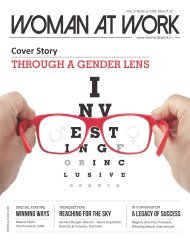February 2016 Woman At Work Digital
Create successful ePaper yourself
Turn your PDF publications into a flip-book with our unique Google optimized e-Paper software.
SOCIETY<br />
An Oasis of<br />
GROWTH<br />
In most parts of the rural India, women are denied the right to education and earning<br />
opportunities. The rural belt around Sangli District in Maharashtra is one such area where<br />
there was a large population of women without opportunities to earn and take control of their<br />
future. Payod Industries took it upon themselves to put an end to their plight and take these<br />
rural women out of financial and social doldrums. Megha Johari talks to Snehal Londhe,<br />
co-founder of Payod Industries to understand more about their socio-commercial venture and<br />
impact.<br />
here was a time when<br />
Hingangaon village, near Sangli<br />
district was an unknown barren<br />
land on the map of Maharashtra. Before<br />
2008, the village was entrenched with<br />
all kinds of social vices like<br />
discrimination based on scheduled and<br />
backward caste practices, oppression of<br />
women and denial of rights to the girl<br />
child. The only source of paltry income<br />
of the villagers was the agricultural<br />
activities, which was seasonal and<br />
cyclic. But after the setting up of a<br />
glove making factory, Payod Industries,<br />
the village has found its place under the<br />
sun.The gloves production unit has<br />
changed the life and aspirations of the<br />
village otherwise crumbling under its<br />
own scarcities. All this has been brought<br />
about by the incessant efforts and<br />
determination of Devanand and Snehal<br />
Londhe, the couple who founded this<br />
socio-commercial enterprise.<br />
When Snehal Londhe and her<br />
husband decided to give up their cushy<br />
jobs and become social entrepreneurs,<br />
they were aghast at the state of the<br />
democratic and secular India. Snehal<br />
recalls, “When we decided to set up the<br />
factory in Hingangaon, we had to<br />
encounter a lot of resistance from<br />
villagers, men and women alike because<br />
they had never imagined working in a<br />
factory environment. The women had<br />
never stepped out of the house to do<br />
more than fetch the basic necessities or<br />
become a farmhand.” To make matters<br />
worse was the foreboding of the caste<br />
barriers and acute poverty. Bracing<br />
such stiff resistance and lack of skills<br />
among villagers what pushed the<br />
Londhe couple to start a makeover<br />
<strong>February</strong> <strong>2016</strong> | 37














